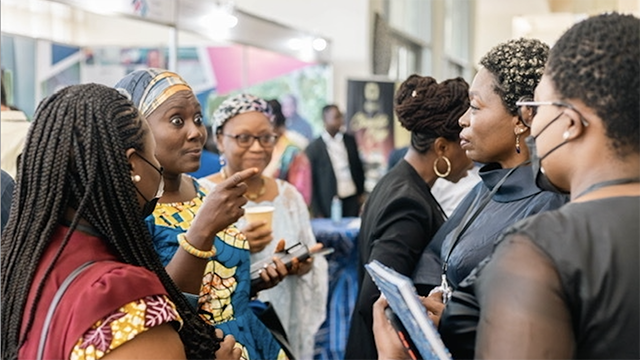Recently, Partners for a New Beginning, of which the Aspen Institute is the Secretariat, hosted a series of discussions on the various ways in which diaspora members can positively impact the economies of their home countries, including policy engagement, technology and remittances. As part of the Global Diaspora Forum “unconference” day, the Secretariat invited diaspora community members from its 10 member countries to participate.

Diaspora leaders from PNB countries of operation–
Indonesia, Turkey, Libya, and Tunisia.
The Partners for a New Beginning network spans economies and populations diverse in experience, culture, size, and foci, and these discussions were an exciting opportunity for diaspora leaders and diaspora experts to trade best practices and share lessons learned. Turkish Chamber of Commerce and Industry President Celal Secilmis, representing the viewpoint of the prolific Turkish-American diaspora community—whose top representatives include Chairman and CEO of The Coca-Cola Company and PNB Vice-Chair Muhtar Kent—commented that the best part of diaspora work is mentoring other diasporas. Likewise, Mohamad Al-Arief of the Indonesian Diaspora Network said Indonesia is new to diaspora organization (their first convening was in Los Angeles in 2012), but his country experienced its own “Indonesian Spring” in 1998 and has plenty of lessons learned it can share with the transitioning Middle East and North Afria region.
Regarding Libya, Salah Bugazia of Acumen Solutions, who also serves on the Board of Directors of the Libyan American Organization, emphasized the importance of building frameworks for diaspora engagement before leveraging their resources. This spring, the PNB Secretariat is hosting two fellows from Libya in partnership with Syracuse University’s Leaders for Democracy Fellows program—Benghazi University civil engineering instructor Ahmed Mneina and Creative Associates International program and operations coordinator Ahmed Amer. Both Fellows attended the discussions, keen to hear the diaspora feedback on Libya’s transition, and they shared the following joint comment:
Since Libya is going through a critical transitional phase, it needs every available capability and experience from Libyans inside and outside the country to succeed. The need for a deep participation from its diaspora is necessary for the development of its public and private sectors (business, education, government institutes, etc…), and the diaspora can play a strong role in facilitating cooperation between US and Libyan enterprises. That cooperation is key to a successful transition to of economic, social, and political stability.
PNB seeks to strengthen relationships between the US and PNB countries by catalyzing and convening networks of leaders to advance economic opportunity in the areas of entrepreneurship, education and innovation. Working with diaspora communities has recently become a key component of PNB and will continue to grow as the PNB Secretariat engages the largely untapped bridge between PNB counties and the US.

